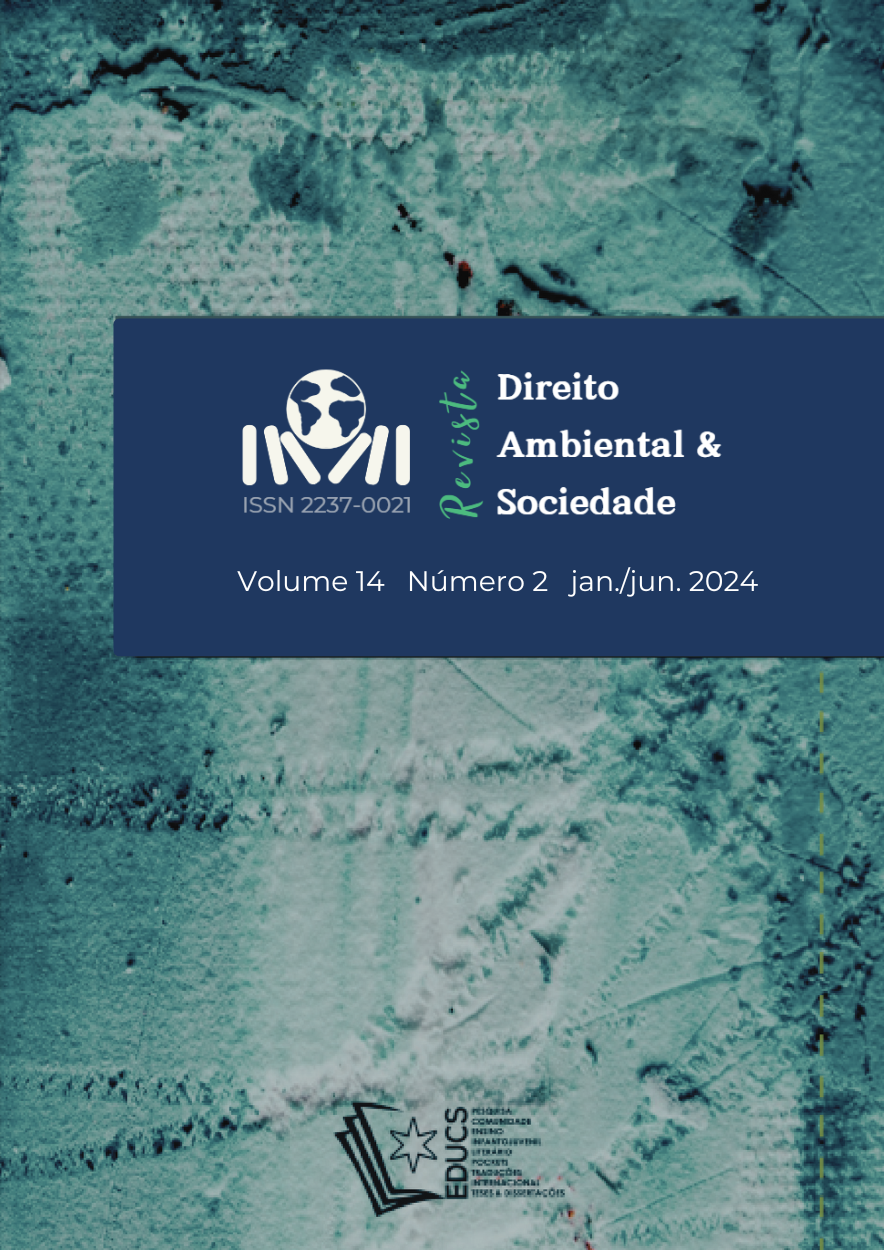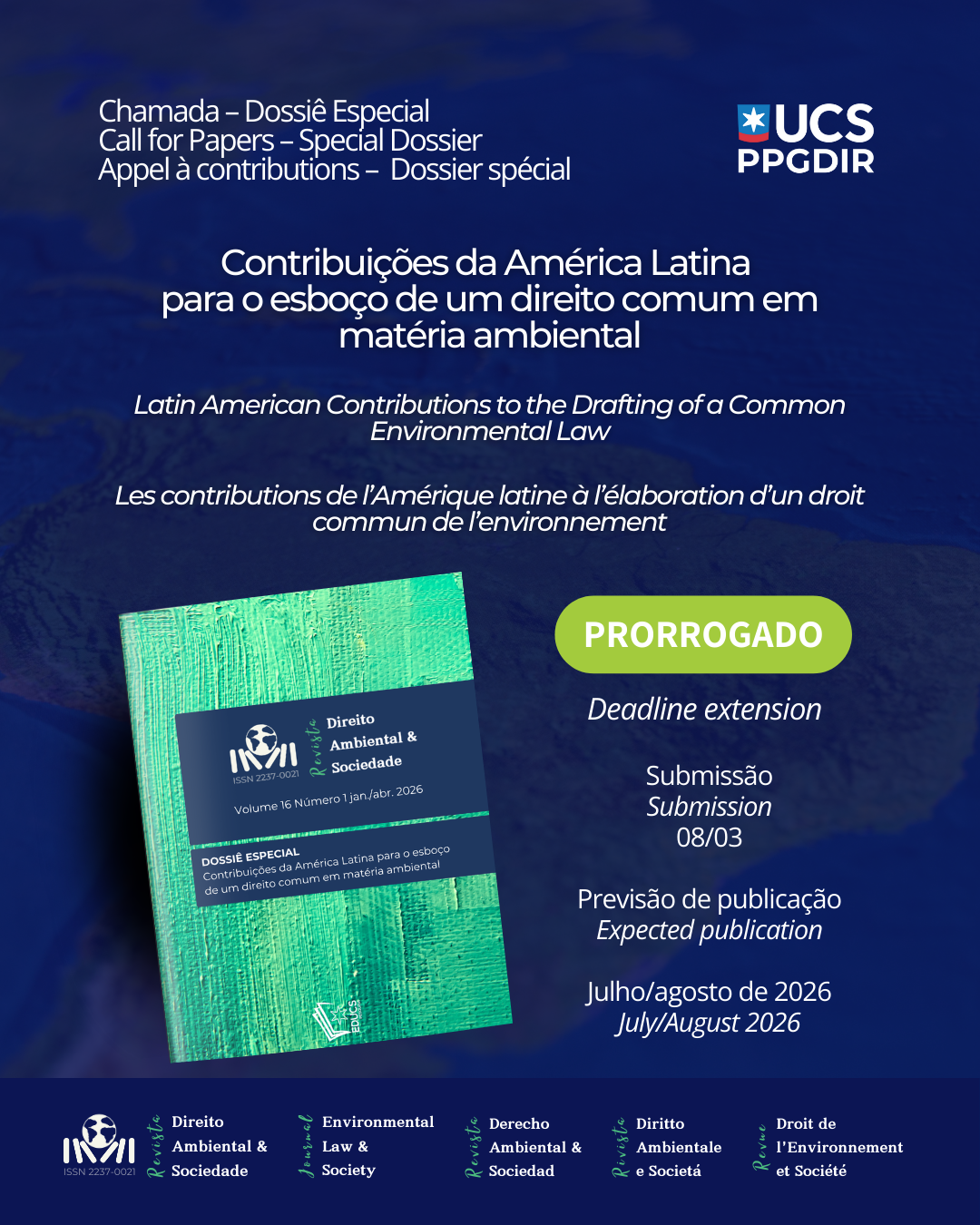Pigouvian tax
the origin of ecological taxation and the counterpoint of the Coase Theorem
DOI:
https://doi.org/10.18226/22370021.v14.n2.09Keywords:
tax extrafiscality, environmental protection;, Coase theorem, pigouvian tributeAbstract
It is undeniable that, over the last decades, there has been a real revolution in the modes of production and consumption, stimulated by factors such as economic development, unbridled population growth, urbanization in large centers and the technological revolution. One of the main challenges of the modern world is to develop effective strategies to cool the growing degradation of ecosystems. In this context, the State has the important duty, constitutionally conferred, to develop efficient public policies in the defense and preservation of the environment. Among the most celebrated instruments currently, aimed at this purpose, stands out and the exploitation of the extrafiscality of taxes to induce adequate socio-environmental behaviors. Because of this, the importance of understanding the characteristics and origin of this public policy, which goes back to the theory of the English economist Arthur Cecil Pigou, of the first half of the twentieth century, is overtaken. The pigouvian tribute, with its characteristic of burdening production processes so that the degrader internalizes marginal social costs, found a counterpoint in the studies of the economist Ronald Coase (1960), with his Coase theorem. For this economist, the solution to the externalities generated involves property rights and should be the subject of negotiation between the affected parties, without state intervention. Thus, the present study, through the adoption of the deductive approach method, a qualitative, theoretical and descriptive research, investigated the foundations of the pigouvian tribute and the criticisms of this systematics formulated by Ronald Coase.
Downloads
References
BECKER, Alfredo A. Teoria geral do direito tributário. 5. ed. São Paulo: Noeses, 2010.
BENEVIDES, Gustavo et al. Tributação como instrumento promotor da sustentabilidade: mito ou verdade? Um estudo nos municípios componentes da Região do Grande ABC. In: Anais do Congresso Brasileiro de Custos-ABC. 2011. Disponível em: www.anaiscbc.abcustos.org.br/anais/article/view/515/515. Acesso em: 04 de jan. de 2023.
CALIENDO, Paulo. Extrafiscalidade ambiental: instrumento de proteção ao meio ambiente equilibrado. In: BASSOS, Ana Paula. et al. (Org.). Direito e desenvolvimento sustentável: desafios e perspectivas. Curitiba: Juruá Editora, 2013. p. 165-193.
CAVALCANTE, Denise Lucena. Tributação ambiental: por uma remodelação ecológica dos tributos. Revista do Programa de Pós-Graduação em Direito - UFC. Fortaleza. vol. 32, nº 02, p. 101-115, jul-dez 2012.
COASE, Ronald. The Problem of Social Cost. The Journal of Law & Economics. University of Chicago Press. vol. 3, p. 1-44, out. 160. Disponível em: https://www.jstor.org/stable/724810. Acesso em: 20 de dez. de 2022.
DAMACENA, Fernanda; FARIAS, Carmem. Meio ambiente e Economia: uma perspectiva para além dos instrumentos de comando e controle. Revista de Direito Econômico e Socioambiental, Curitiba, v. 8, n. 1, p. 148-181, jan./abr. 2017.
FRATINI, Danielle Eugenne Migoto Ferrari. Tributação e regulação econômica. Os tributos “pigouvianos”: Excise taxes e sin taxes. Revista da Procuradoria do Estado de São Paulo. v. 94, p. 175-200, 2021. Disponível em:09__Revista_PGE_94__Tributação+e+regulação+econômica.+Os+Tributos+“Pigouvianos”+Excise+Taxes+e+Sin+Taxes.pdf. Acesso em: 04 de jan. de 2023.
REFERÊNCIA DO AUTOR
LAGEMANN, Eugênio. Tributação Ecológica. Ensaios FEE, Porto Alegra, v. 23, n. 1, p. 301-324, 2002.
MITCHELL, Willian C,; SIMMONS, Randy T. Para Além da Política: mercados, bem-estar social e o fracasso da brocaria. 5. ed. Rio de Janeiro: Topbooks, 2003.
MONTERO, Carlos Eduardo Peralta. Tributação ambiental: reflexões sobre a introdução da variável ambiental no sistema tributário. São Paulo: Saraiva, 2014.
NEVES, Vítor. O Problema dos Custos Sociais. CENTEMERI, Laura; CALDAS, José Castro (Org.). Valores em Conflito: megaprojetos, ambiente e território. Coimbra: Almedina, 2016. p. 61-87.
SANTOS, Laura Meneghel dos; PORTO, Antônio José Maristello; SAMPAIO, Rômulo Silveira da Rocha. Direito de Propriedade e Instrumentos Econômicos de Regulação Ambiental: análise das atribuições implícitas. Revista Brasileira de Políticas Públicas, Brasília v. 7, n. 2, p. 97-120, ago. 2017.
LEITE, Acácio Zuniga et al. Reforma Tributária Ambiental: Perspectivas para o Sistema Tributário Nacional. Texto para Discussão. Plataforma Política Social. Fevereiro de 2018. Disponível em: http://sindifisco-pa.org.br/wp-content/uploads/2018/05/TD_18.pdf. Acesso em: 20 de dez. de 2022.
MOTTA, Ronaldo Seroa da. O uso de instrumentos econômicos na gestão ambiental. Rio de Janeiro: Instituto de Pesquisa Econômica Aplicada - IPEA, 2000. Disponível em: < https://www.ipea.gov.br/portal/index.php?searchword=O+uso+de+instrumentos+econ%C3%B4micos+na+gest%C3%A3o+ambienta&ordering=category&searchphrase=all&Itemid=32&option=com_search>. Acesso em: 02 de jan. de 2023.
TRENNEPOHL, Terence Dorneles. Incentivos fiscais no direito ambiental: para uma matriz energética limpa e o caso no etanol brasileiro. 2. ed. São Paulo: Saraiva, 2011.
VARELA, Carmen Augusta. Instrumentos de políticas ambientais: casos de aplicação e seus impactos. Disponível em: <http://bibliotecadigital.fgv.br/dspace/bitstream/handle/10438/3030/Rel%2062 -2001.pdf?sequence=1> Acesso em: 21 de dez. de 2022.
Downloads
Published
How to Cite
Issue
Section
License
Copyright (c) 2024 Journal of Environmental Law and Society

This work is licensed under a Creative Commons Attribution 4.0 International License.
Você tem o direito de:
Compartilhar — copiar e redistribuir o material em qualquer suporte ou formato para qualquer fim, mesmo que comercial.
Adaptar — remixar, transformar, e criar a partir do material para qualquer fim, mesmo que comercial.
O licenciante não pode revogar estes direitos desde que você respeite os termos da licença.
De acordo com os termos seguintes:
Atribuição — Você deve dar o crédito apropriado , prover um link para a licença e indicar se mudanças foram feitas . Você deve fazê-lo em qualquer circunstância razoável, mas de nenhuma maneira que sugira que o licenciante apoia você ou o seu uso.
Sem restrições adicionais — Você não pode aplicar termos jurídicos ou medidas de caráter tecnológico que restrinjam legalmente outros de fazerem algo que a licença permita.
Avisos:
Você não tem de cumprir com os termos da licença relativamente a elementos do material que estejam no domínio público ou cuja utilização seja permitida por uma exceção ou limitação que seja aplicável.
Não são dadas quaisquer garantias. A licença pode não lhe dar todas as autorizações necessárias para o uso pretendido. Por exemplo, outros direitos, tais como direitos de imagem, de privacidade ou direitos morais , podem limitar o uso do material.














